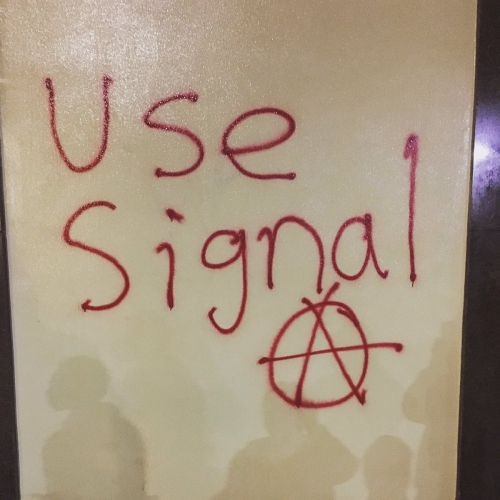The number of tools that could be used for building, maintaining and composting solidarity infrastructures, are innumerable — Facebook is used in all kinds of beautiful ways for mutual aid groups and sharing knowledge, even if the project as a whole has a lot that could be asked from it, to put it mildly.
At the same time, tools have particular affordances that make them more or less suited for different purposes. Historically, there was no distinction between art and technology — the cursed phrase "the intersection of art and technology" was kind of redundant.
This resource is an incomplete list of some of the tools this class explored and that inspire us. Note: some of the descriptions of tools in this page are quite technical, and in the class we would spend more time exploring internet foundations to understand what these tools are actually doing, but this document is more of a summary list.

Yunohost
Yunohost is a tool to help you easily manage a server for yourself, your friends, or a group of people.
It's free to use, open source, grant-funded and well-maintained. The Yunohost application catalog is a good snapshot of all the different open source applications that have been packaged for Yunohost. Looking at the catalog, I feel a sense of awe at how much free software is being produced and maintained.
Some of our favorite applications from the catalog:
- Etherpad, for simple collaborative text documents
- Nextcloud, for sharing files
- Hedgedoc, for rich document editing
- Outline, for the class wiki
- Cryptpad, for encrypted document editing and file sharing
- We also used Big Blue Button, an open-source self-hostable software for video conferencing, which does not currently have a yunohost package (if anyone is inspired to make one).
- For an alternative to github we recommend, Codeberg, which is also where the git repository for this website is hosted.
For many of these self-hostable tools, the best way to use them is to find a tech-cooperative that you want to join or become a member of that can host the tools on your behalf, such as data.coop, or another coop which is close to you or you resonate with. For most people this is more practical and resilient than individually self-hosting.
Coop-Cloud
Coop-cloud is another hosting/deployment framework, which could technically be summarized as "Yunohost but using Docker"
It's a really inspiring project, and we appreciate their emphasis on cooperative hosting.
Permacomputing
One nice definition of Permacomputing according to Fiber Space:
"Said with tongue in cheek, permacomputing is a radically slightly more sustainable approach to computer and network technology inspired by permaculture. It is both a concept and a small nascent community of practice-oriented around issues of resilience and regenerativity in digital technology derived, among others, from permaculture principles. In a time where computing epitomises industrial waste, permacomputing encourages the maximising of hardware lifespans, minimising energy use and focussing on the use of already available computational resources."
According to permacomputing.net, a permacomputing wiki, "Permacomputing is both a concept and a community of practice oriented around issues of resilience and regenerativity in computer and network technology inspired by permaculture. ପໄଓ☾☼✫ -☆:*´"
From an artistic perspective, we especially appreciate how Permacomputing approaches limits as a source of creativity, instead of just as an obstacle to be overcome.
Some permacomputing and permacomputing-adjacent projects that inspire us:
- Gemini, is a more minimal alternative to html, with the intention to "build a lightweight online space where documents are just documents, in the interests of every reader's privacy, attention and bandwidth".
- Post-Market OS, is a linux operating system for phones, to extend the life-time of phones that no longer receive updates due to planned obsolesence, and make phone operating systems more safe and private
- Lichen is "the simplest possible CMS for the web that is friendly enough for non-technical users"
- Lichen-Markdown is a fork of Lichen that uses Markdown instead of Gemtext, making is slightly more flexible for everyday use-cases
- UXN, is a computing framework based on a small virtual machine that can run in many different environments
- HTML Energy, is all around us and in this very website
Communication Tools
As Twitter slowly distengrates, and with growing distrust of Big Tech's social networks in general, there is a proliferation of new alternative networks, in different stages of nascency and use.
There are also a number of alternative messengers that are quite practical as replacements for Slack, Discord or Whatsapp:

P2P Protocols
There are also a number of protocols being actively developed which inspire us, even if they don't yet have many applications built on top of them.
- Willow, a protocol for synchronizable datastores, powering Earth Star II
- P2Panda, a protocol for local-first applications
- Veilid, a networked application framework for building distributed, private apps
Mesh Networks
- Libremesh, a framework for creating Open-WRT-based wireless mesh networks
Speculative Tools
Some tools are perhaps more intended to try an idea out than for everyday use, but are full of inspiration.
- Spring 83, a speculative protocol resembling a bulletin board
- Temple OS, a devotional operating system
Other Self-Hosting Tools
Yunohost and Coop-cloud have been the focus so far, but there are a number of other frameworks and tools for self-hosting, including,
Other Resources
This page is just a small sample of a field of infinite possibilities that is ever-changing.
Here are some other collections:
- Damaged Earth Catalog, a collection of practices and tools
- Awesome-Small-Web-Publishing, a list of tools for simple and small web publishing
- awesome-selfhosted, a list of self-hostable apps
- awesome-offline-first, a collection of resources related to offline-first apps
Last Updated: 8.15.2024